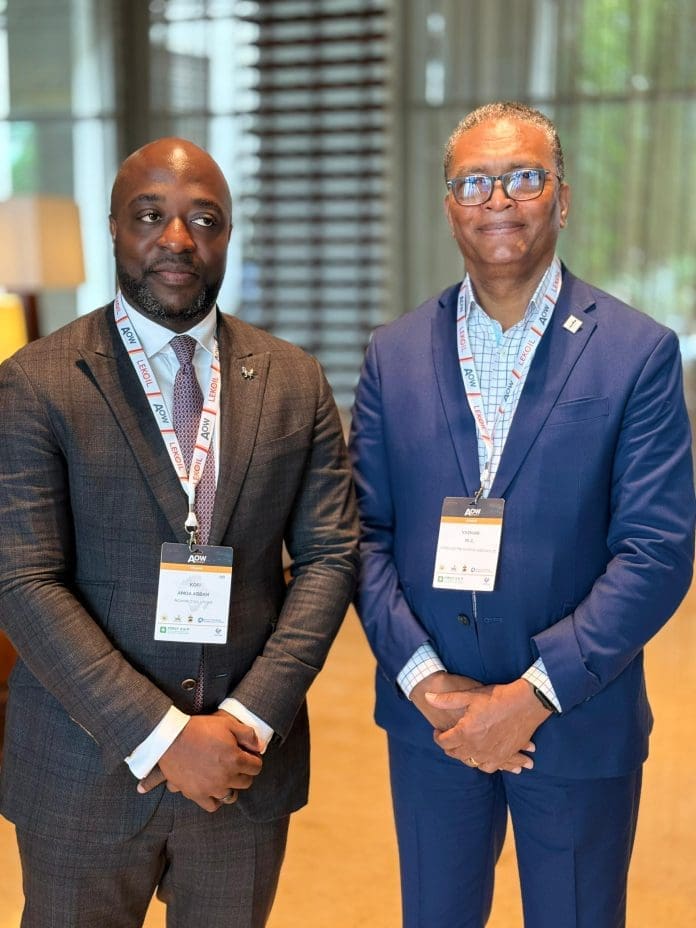Africa Oil Week 2025 concluded yesterday at the Kempinski Hotel in Accra after four days of high-level discussions that positioned Ghana at the center of continental energy transformation, with indigenous industry leaders playing prominent roles in shaping Africa’s upstream development strategies.
The historic gathering marked the first time in thirty years that Africa’s premier energy summit moved from Cape Town to West Africa, creating unprecedented platforms for local entrepreneurs like Rigworld Group founder Kofi Amoa-Abban to engage directly with international investors and policy makers.
Energy Minister John Jinapor led Ghana’s delegation alongside experts from across Africa, the African Union, World Bank, and multinational companies, establishing frameworks for increased African participation in continental energy value chains. The ministerial presence underscored Ghana’s commitment to leveraging its hosting role for strategic economic advantages.
Indigenous energy companies like Rigworld Group benefited significantly from direct access to decision-makers who typically gather in distant locations. The Accra venue eliminated traditional barriers that limited participation by smaller local companies in continental networking opportunities essential for business expansion across West African markets.
Kofi Amoa-Abban’s presence represented Ghana’s indigenous success stories in oil and gas services, demonstrating how local content policies can create competitive enterprises capable of regional expansion. His company’s evolution from service provider to manufacturer exemplifies the value-added industrial development that conference discussions aimed to replicate across African markets.
The summit focused on upstream development, mergers and acquisitions, and exploration opportunities that align directly with Rigworld’s core competencies in offshore, onshore, and nearshore operations. These discussions create pathways for companies like Rigworld to participate in larger regional projects through partnerships with international operators.
Rigworld’s establishment of manufacturing facilities in Takoradi showcases the type of local capacity building that Africa Oil Week promotes. The company’s production of stud bolts, nuts, and specialized engineering equipment demonstrates how indigenous firms can capture greater value within continental energy supply chains.
The conference highlighted policies encouraging African companies to expand beyond traditional service provision into manufacturing and technical innovation. Rigworld’s diversification across mining, construction, power, marine, and petrochemical sectors exemplifies strategic approaches discussed during the four-day gathering.
Ghana’s successful hosting demonstrates the country’s readiness to serve as West Africa’s energy hub, with established regulatory frameworks and proven commercial production providing foundations for increased regional investment. The smooth execution positions Ghana favorably for future international energy conferences and related business opportunities.
The Rigworld Training Center’s $8.5 million investment in human capital development resonated with conference themes about sustainable capacity building. Such initiatives address skills gaps that historically limited African participation in technical energy sector positions while creating pathways for professional advancement.
Continental networking opportunities enabled Ghanaian companies to explore partnerships that could accelerate expansion across African markets. The conference facilitated connections between local content champions and international operators seeking reliable African partners for upstream development projects.
Energy transition discussions balanced traditional oil and gas development with renewable energy integration, reflecting changing global investment patterns. Companies like Rigworld, with diversified portfolios spanning multiple industries, are well-positioned to benefit from evolving energy landscapes discussed during the summit.
The historic venue change to Ghana created opportunities for deeper exploration of local content policies that have enabled indigenous companies to thrive. Success stories like Rigworld provide evidence for increased African participation in continental energy development while maintaining competitive operational standards.
Investment promotion sessions connected African energy companies with development finance institutions and private investors seeking opportunities in emerging markets. The direct access facilitated by Ghana’s hosting creates potential funding sources for expansion projects that could benefit from international partnerships.
Policy development discussions addressed regulatory harmonization across African energy markets, creating frameworks for increased cross-border operations. These developments particularly benefit companies like Rigworld that already operate across multiple West African jurisdictions and seek expanded regional presence.
The conference concluded with commitments to strengthen African energy independence through increased indigenous participation in upstream development. Ghana’s hosting success positions the country as a continued leader in continental energy discussions while creating business opportunities for local industry champions.
As delegates departed Accra yesterday, the consensus emerged that Ghana’s hosting demonstrated West Africa’s readiness for increased energy investment and indigenous participation. The successful execution creates momentum for continued regional energy development while establishing Ghana as a preferred destination for international energy conferences.
For entrepreneurs like Kofi Amoa-Abban, the concluded summit represents validation of indigenous capabilities while opening new avenues for continental expansion that could transform Ghana’s energy services landscape in coming years.
Source: newsghana.com.gh











